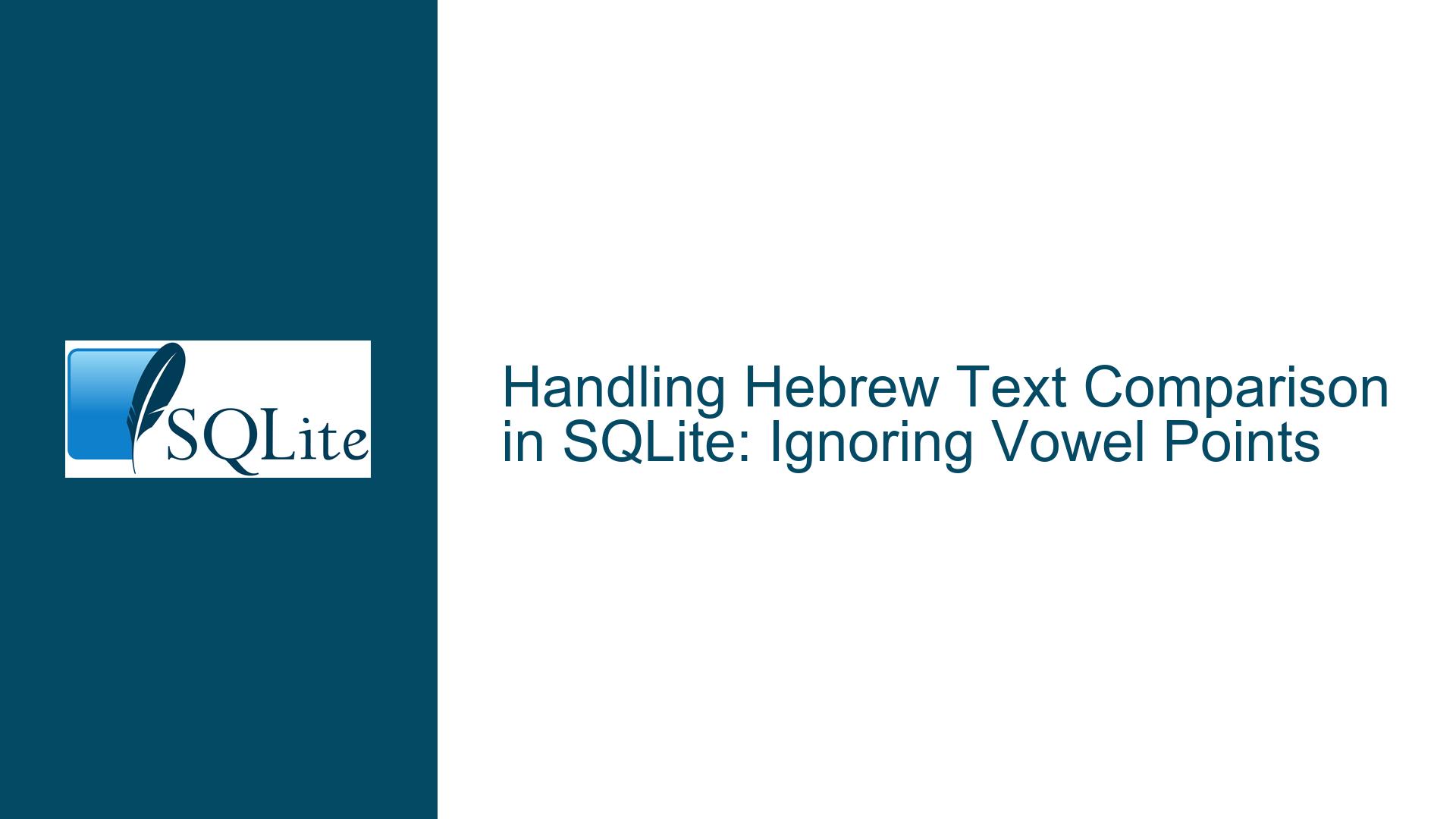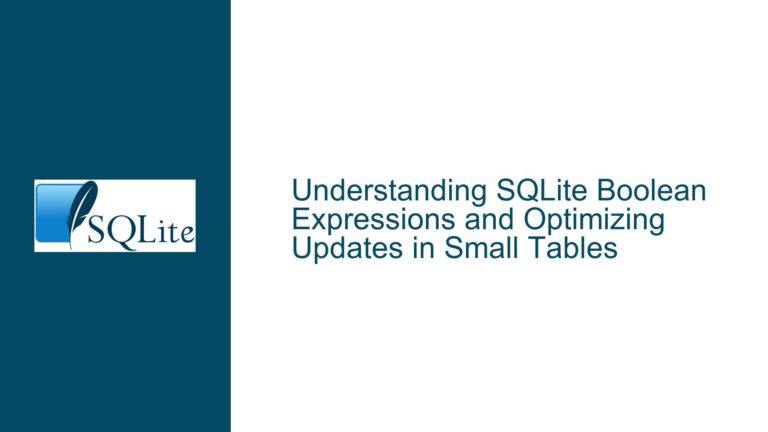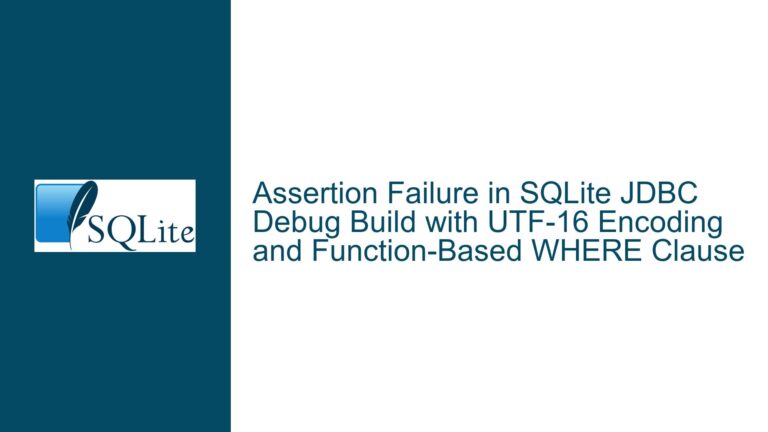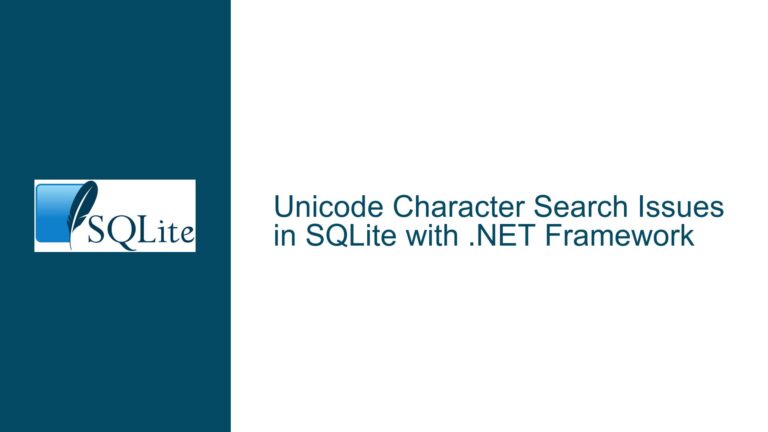Handling Hebrew Text Comparison in SQLite: Ignoring Vowel Points
Hebrew Text Comparison Challenges with Optional Vowel Points
When working with Hebrew text in SQLite, one of the most nuanced challenges arises from the language’s use of optional vowel points (niqqud). Hebrew is a Semitic language where vowels are often omitted in written text, and vowel points are used sparingly, typically in religious texts, poetry, or educational materials. This creates a unique problem for database queries, as the same word can appear in multiple forms—with or without vowel points—while retaining the same semantic meaning. For example, the word "שָׁלוֹם" (shalom) might also be written as "שלום" without the vowel points.
In SQLite, text comparison is typically performed using the LOWER and TRIM functions, which standardize the case and remove leading/trailing whitespace. However, these functions do not account for the presence or absence of vowel points in Hebrew text. This limitation becomes apparent when querying a database where some entries include vowel points and others do not. A query like SELECT * FROM buttons WHERE LOWER(TRIM(message)) = LOWER(TRIM("%@")) will fail to match entries that differ only in their use of vowel points.
The core issue lies in SQLite’s default text handling mechanisms, which treat characters with and without vowel points as distinct entities. This behavior is rooted in SQLite’s reliance on Unicode character encoding, where vowel points are represented as combining characters. For example, the Hebrew letter "ש" (shin) followed by a vowel point is stored as two distinct Unicode code points: one for the base character and one for the combining mark. This means that "שָׁלוֹם" and "שלום" are treated as different strings, even though they represent the same word.
To address this issue, developers often consider creating a separate column in the database to store normalized versions of the text, with all vowel points removed. While this approach can work, it introduces additional complexity, such as maintaining consistency between the original and normalized columns and handling special cases where vowel points are semantically significant. Furthermore, this solution does not leverage SQLite’s built-in capabilities for text comparison, making it less elegant and potentially less efficient.
Custom Collation Sequences and Unicode Grapheme Clustering
One potential solution to the Hebrew text comparison problem lies in SQLite’s support for custom collation sequences. A collation sequence defines how strings are compared and sorted, and SQLite allows developers to create custom collations tailored to specific linguistic requirements. In the context of Hebrew text, a custom collation sequence could be designed to ignore vowel points during comparison, effectively treating "שָׁלוֹם" and "שלום" as equivalent.
The key to implementing such a collation sequence is understanding Unicode grapheme clustering. In Unicode, a grapheme cluster represents a single user-perceived character, which may consist of multiple code points. For example, the Hebrew word "שָׁלוֹם" is composed of several grapheme clusters, each representing a base character and its associated vowel points. By defining a custom collation sequence that operates on grapheme clusters rather than individual code points, it becomes possible to ignore vowel points during comparison.
Creating a custom collation sequence in SQLite involves writing a C function that implements the desired comparison logic and registering it with the database using the sqlite3_create_collation API. The function would need to iterate through the grapheme clusters of the input strings, stripping out vowel points before performing the comparison. While this approach requires some programming effort, it provides a robust and elegant solution to the Hebrew text comparison problem.
Another consideration is the use of existing collation sequences or libraries that handle Hebrew text. While SQLite does not natively include a collation sequence for Hebrew, there may be third-party libraries or extensions that provide this functionality. For example, the ICU (International Components for Unicode) library includes support for Hebrew text processing and could be integrated with SQLite to handle vowel point-insensitive comparisons. However, this approach may introduce additional dependencies and complexity, particularly in environments like iOS where resource constraints are a concern.
Implementing PRAGMA journal_mode and Database Normalization
In addition to custom collation sequences, another approach to handling Hebrew text comparison in SQLite involves normalizing the text at the database level. This can be achieved by creating a separate column in the buttons table to store normalized versions of the message field, with all vowel points removed. The normalized column would be used for comparison purposes, while the original column would retain the full text, including vowel points.
To implement this solution, the first step is to modify the database schema to include the normalized column. For example, the buttons table could be altered as follows:
ALTER TABLE buttons ADD COLUMN message_normalized TEXT;
Next, the normalized column would need to be populated with the vowel-stripped versions of the message field. This can be done using a combination of SQLite string functions and custom logic to remove vowel points. For example, a SQLite function could be written to iterate through the characters of the message field, filtering out combining characters that represent vowel points.
Once the normalized column is populated, queries can be updated to use the normalized column for comparison. For example, the original query:
SELECT * FROM buttons WHERE LOWER(TRIM(message)) = LOWER(TRIM("%@"));
Would be modified to:
SELECT * FROM buttons WHERE LOWER(TRIM(message_normalized)) = LOWER(TRIM("%@"));
This approach ensures that comparisons are performed on the normalized text, ignoring vowel points. However, it also introduces the need to maintain consistency between the message and message_normalized columns. This can be achieved using SQLite triggers, which automatically update the normalized column whenever the message field is modified. For example:
CREATE TRIGGER update_message_normalized AFTER UPDATE ON buttons
BEGIN
UPDATE buttons SET message_normalized = STRIP_VOWELS(NEW.message) WHERE id = NEW.id;
END;
In this example, STRIP_VOWELS is a custom SQLite function that removes vowel points from the input text. The trigger ensures that the message_normalized column is always up-to-date, eliminating the need for manual updates.
Finally, it is important to consider the performance implications of this approach. Adding a normalized column and associated triggers increases the complexity of the database schema and may impact write performance. However, the benefits of simplified query logic and improved comparison accuracy often outweigh these drawbacks, particularly in applications where Hebrew text comparison is a frequent operation.
In conclusion, handling Hebrew text comparison in SQLite requires a nuanced understanding of Unicode grapheme clustering, custom collation sequences, and database normalization techniques. By leveraging these tools, developers can create robust and efficient solutions that account for the unique characteristics of Hebrew text, ensuring accurate and consistent comparisons regardless of the presence or absence of vowel points.






